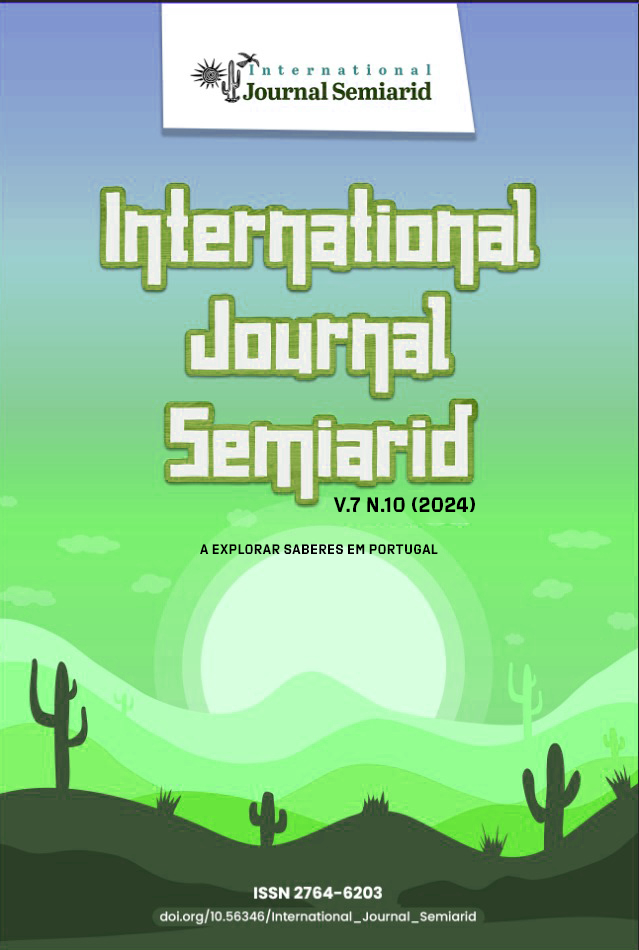THE IMPORTANCE OF URBAN GREEN SPACES AND WATER MANAGEMENT. CASE STUDY OF AZEITÃO, SETÚBAL MUNICIPALITY (PORTUGAL)
DOI:
https://doi.org/10.56346/ijsa.v7i10.293Keywords:
Green areas; Native plants; Water efficiencyAbstract
Urban green areas are essential not only for the conservation of biodiversity and the provision of ecological services, but also for human well-being. However, in order to keep these areas functioning properly, it is necessary to supply large quantities of water to the plant material that makes them up. As water is the most precious resource we have and on which all living beings and human activities depend, it is necessary to look for ways to save it. A study on these areas was carried out in Azeitão in the municipality of Setúbal in Portugal and it was proposed to use a set of native plant species adapted to local environmental conditions and with high ornamental potential in order to reduce water consumption in irrigation. In this way, it was shown that water saving in urban green spaces and the conservation of them and their biodiversity are reconcilable.
References
Árvores e Arbustos de Portugal. (s.d.). Pistacia lentiscus. https://www.arvoresearbustosdeportugal.com/portfolio-item/aroeira-pistacia-lentiscus/
Árvores e Arbustos de Portugal. (s.d.). Rhamnus alaternus. https://www.arvoresearbustosdeportugal.com/portfolio-item/sanguinho-das-sebes-rhamnus-alaternus/
Árvores e Arbustos de Portugal. (s.d.). Olea europaea var. sylvestris. https://www.arvoresearbustosdeportugal.com/portfolio-item/zambujeiro-olea-europaea-subsp-europaea-var-sylvestris/
BILGILI, B. C., & GÖKYER, E. (2012). Urban green space system planning. In M. Ozyavuz (Ed.), Landscape Planning (pp. 107–122). InTech. https://doi.org/10.5772/45877
Biorede. (s.d.). Arbutus unedo. http://www.biorede.pt/page.asp?id=1750
CANTEIRO, M., ARELLANO-AGUILAR, O., BRAVO, J. E. B., & ZAMBRANO, L. (2023). Urban green spaces and their relationship with groundwater quality: the case of a shallow aquifer in the south of Mexico City. Sustainable Water Resources Management, 9(5). https://doi.org/10.1007/s40899-023-00935-x
CASTROVIEJO, S. & al. (Coord. gen.) 1986-2019. Flora iberica 1-16(I-III), 17-18, 20-21. Real Jardín Botánico, CSIC. Madrid.
Direção-Geral do Território. (2022). Carta de Uso e Ocupação do Solo (2018) à escala 1: 25 000. Disponível em https://snig.dgterritorio.gov.pt/
Direção-Geral do Território. (2024). Carta Administrativa Oficial de Portugal - CAOP 2023 (Continente). Disponível em https://snig.dgterritorio.gov.pt/
ESRI, Maxar, Earthstar Geographics, & Comunidade de Utilizadores SIG. (2009). Basemap “World Imagery”. https://www.arcgis.com/home/item.html?id=10df2279f9684e4a9f6a7f08febac2a9
GeoPortal de Setúbal, Câmara Municipal de Setúbal. (2016). Cartografia 1: 10 000 da Hidrografia do Município de Setúbal. Disponível em https://sig.mun-setubal.pt/websigsetubal/
HOSSAIN, M. Z. (2015). Water: The Most Precious Resource of Our Life. 2(9), 1436–1445. ISSN 2394 5788
Instituto da Conservação da Natureza e das Florestas, I.P. (2023). Rede Nacional de Áreas Protegidas (RNAP). Disponível em https://snig.dgterritorio.gov.pt/
JABBAR, M., YUSOFF, M. M., & SHAFIE, A. (2022). Assessing the role of urban green spaces for human well-being: a systematic review. In GeoJournal (Vol. 87, Issue 5, pp. 4405–4423). Springer Science and Business Media Deutschland GmbH. https://doi.org/10.1007/s10708-021-10474-7
MONTEIRO, L., CRISTINA, R., & COVAS, D. (2021). Water and energy efficiency assessment in urban green spaces. Energies, 14(17). https://doi.org/10.3390/en14175490
MULUNEH, M. G., & WORKU, B. B. (2022). Contributions of urban green spaces for climate change mitigation and biodiversity conservation in Dessie city, Northeastern Ethiopia. Urban Climate, 46. https://doi.org/10.1016/j.uclim.2022.101294
ONDER, S., & DURSUN, S. (2010). Global Climate Changes and Effects on Urban Climate of Urban Green Spaces. International Journal of Thermal and Environmental Engineering, 3(1), 37–41. https://doi.org/10.5383/ijtee.03.01.006
PINTO, J. A. C. M. (2018). A Quantificação de Serviços Ecossistémicos Para a Classificação de Espaços Verdes Urbanos: um Estudo de Caso em Guimarães. Escola de Engenharia, Universidade do Minho, Braga. Disponível em https://hdl.handle.net/1822/59397
RAI, C. M., DORJI, Y., & ZANGMO, S. (2022). User Satisfaction and the Social and Environmental Benefits of Urban Green Spaces: A Case Study of Thimphu City, Bhutan. Nakhara: Journal of Environmental Design and Planning, 21(2). https://doi.org/10.54028/NJ202221216
RAKHSHANDEHROO, M., JOHARI, M., YUSOF, M., ARABI, R., PARVA, M., & NOCHIAN, A. (2017). The Environmental Benefits Urban Open Green Spaces. Alam Cipta, 10(1), 10-16. https://core.ac.uk/download/pdf/153833984.pdf
SEQUEIRA, M. M. DE., ESPÍRITO-SANTO, D., AGUIAR, C., CAPELO, J. & HONRADO, J. (2011). Checklist da Flora de Portugal (Continental, Açores e Madeira). Associação Lusitana de Fitossociologia. Disponível em http://hdl.handle.net/10198/6971
Sistema Nacional de Informação do Solo, Direção-Geral de Agricultura e Desenvolvimento Rural. (2021). Cartografia dos Solos à escala 1: 25 000 (Sul). Disponível em https://snisolos.dgadr.gov.pt/downloads
SOBRAL, B. (2024). Contributo para melhorar a eficiência da rega das áreas verdes urbanas diante da crescente escassez hídrica na União das Freguesias de Azeitão [Trabalho de conclusão de curso, Universidade de Évora].
Sociedade Portuguesa de Botânica. (s.d.). Arbutus unedo. Flora-On. https://flora-on.pt/#/1arbutus+unedo
Sociedade Portuguesa de Botânica. (s.d.). Olea europaea var. sylvestris. Flora-On. https://flora-on.pt/?q=Olea - /0547_
Sociedade Portuguesa de Botânica. (s.d.). Pistacia lentiscus. Flora-On. https://flora-on.pt/ - 1Pistacia+lentiscus
Sociedade Portuguesa de Botânica. (s.d.). Rhamnus alaternus. Flora-On. https://flora-on.pt/ - 1Rhamnus+alaternus
Sociedade Portuguesa de Botânica. (s.d.). Viburnum tinus. Flora-On. https://flora-on.pt/ - 1Viburnum+tinus
SONG, P., GUO, J., XU, E., MAYER, A. L., LIU, C., HUANG, J., TIAN, G., & KIM, G. (2020). Hydrological effects of urban green space on stormwater runoff reduction in Luohe, China. Sustainability (Switzerland), 12(16). https://doi.org/10.3390/su12166599
SZÁRAZ, L. (2014). The Impact of Urban Green Spaces on Climate and Air Quality in Cities. Geographical Locality Studies, 2(1), 326–354. https://www.researchgate.net/publication/273448097
Unidade de Geologia, Hidrogeologia e Geologia Costeira, Laboratório Nacional de Energia e Geologia, I. P. (2010). Carta Geológica de Portugal, na escala 1:1 000 000. Disponível em https://geoportal.lneg.pt/pt/dados_abertos/cartografia_geologica/cgp1m/cgp1m
YAO, L., CHEN, L., WEI, W., & SUN, R. (2015). Potential reduction in urban runoff by green spaces in Beijing: A scenario analysis. Urban Forestry and Urban Greening, 14(2), 300–308. https://doi.org/10.1016/j.ufug.2015.02.014
ZHANG, B., XIE, G. DI, LI, N., & WANG, S. (2015). Effect of urban green space changes on the role of rainwater runoff reduction in Beijing, China. Landscape and Urban Planning, 140, 8–16. https://doi.org/10.1016/j.landurbplan.2015.03.014


